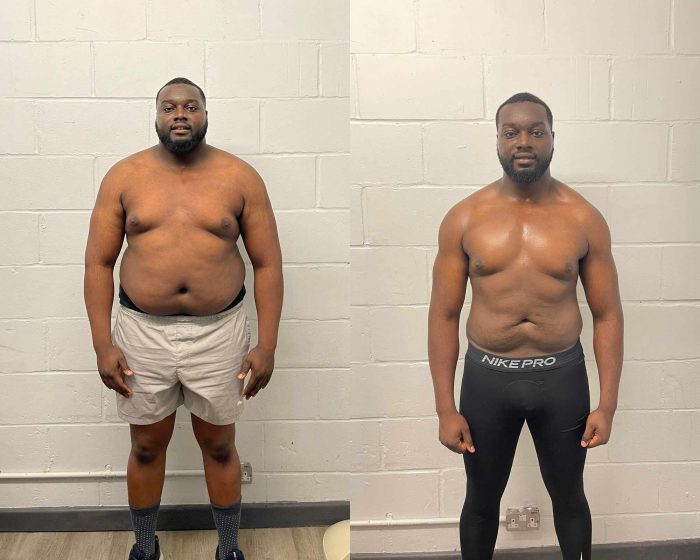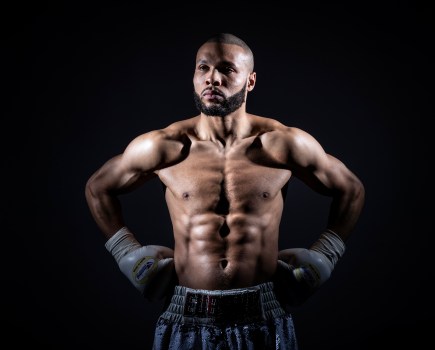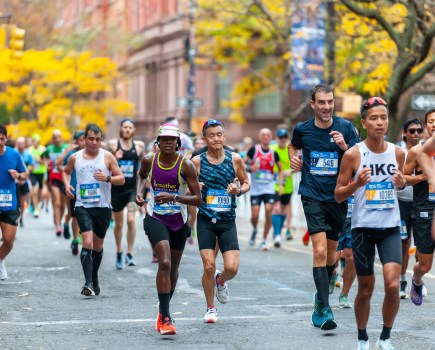Boxing played a huge role in the weight-loss programme that helped Ola Folawiyo lose 25kg, and got him fighting fit in the process. Here are his top training and nutrition tips.
In the UK, research has found that over 70% of adults are uncomfortable with their weight. If you type ‘how to lose weight’ into Google, you’ll be met with more than four billion results, from low-calorie beers to a range of weight-loss programmes. So dropping unwanted pounds is clearly high on many people’s agendas.
Ola Folawiyo is a 29-year-old recruiter from South London. He decided to get serious about losing weight after doctors told him in early 2022 that his 125kg mass meant he was borderline type-2 diabetic. He already had obstructive sleep apnea, a sleep condition that limited him to just three hours of sleep a night.
Ola Folawlyo’s weight-loss programme
Having trained with PT Will Duru at his local gym since lockdown, the pair kicked things up a gear. Duru devised a six-month plan to help Folawiyo not only shed at least 25kg, but also be fit enough to compete in a White Collar boxing match in September, and run a half marathon in October.
With drive, determination, and a love of boxing, Folawiyo embarked on a weight-loss programme that might just have saved his life…
“I’ve had several weight loss attempts – I even tried the keto diet,” he says. “I think I put on more weight than ever. I tried running too; for a big guy people did say that I move quite fast.”
But boxing was a passion, and with Duru specializing in boxing fitness, the pair were a perfect match.
“Boxing is great for weight loss,” explains Duru. “It’s intense and you burn a lot of calories. It’s a cardio workout but also a strength workout as you absorb a lot of force through the body.”
Boxing to lose weight
Folawiyo and Duru did three half-hour sessions each week; one boxing and two strength.
“Our boxing sessions involved pad work. We’d do 1 minute on, 30 seconds off, then build up over time to 3 minutes on, 1 minute off,” explains Duru.
Burpees, press-ups and other exercises were also thrown in the mix. It was the high-intensity workouts that offered the biggest shift when it came to weight loss, according to Folawiyo.
Duru split the strength workouts into upper and lower body.
“Lower-body work involved deadlifts, walking lunges, box jumps, sled pushes and the assault bike,” he explains. “The weight did gradually go up on these moves but we kept the deadlift weight the same at 60kg, focusing on technique and increasing the reps from 5 to 15.”
Upper-body days were a blend of bench press, dumbbell incline press, shoulder press, seated back rows and assisted pull-ups.
“Ola had no upper body strength before; gradually he went from 120kg on the assisted pull-up machine down to 25kg,” says Duru.
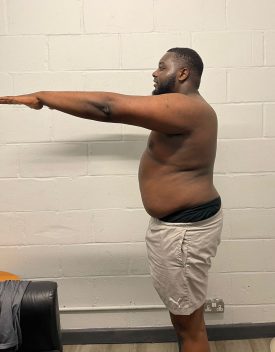

Running and gym sessions for weight loss
Alongside his sessions with Duru, Folawiyo did gym classes plus two sessions a week on the treadmill on incline 5 at speed 6. Some days, he was training up to a staggering three times a day.
“I didn’t want him running until his weight was down to about 105kg to avoid knee injuries from too much weight. After that, he started running outside,” says Duru.
Recovery played a part too. “The stretching with Will was the most painful experience I have ever had. I was close to tears,” says Folawiyo.
Brutal, perhaps, but when he started to see his body changing, there was no going back.
Weight-loss programme: diet and nutrition
With Folawiyo neglecting his diet, Duru set up a meal plan. “Monday to Friday I was strict and then a bit more lenient at weekends. People gave me stick at work,” explains Folawiyo.
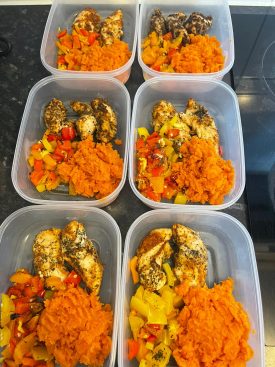
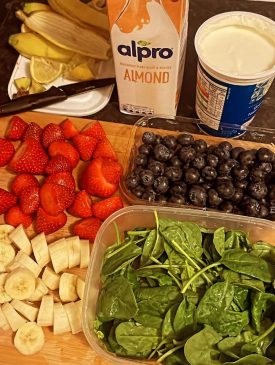
Daily weight-loss diet:
- Breakfast: Oats sachet x 2, oat milk and berries.
- Lunch: Sweet potato, chicken breast and vegetables.
- Dinner: Brown rice, salmon and vegetables.
- Snacks: Protein bars, dry cereal. BCAA supplements for muscle recovery.
Duru took no prisoners when it came to Folawiyo’s weight loss: “I was on his case. If I saw on his Instagram that he was at a restaurant I would go there. I saw him at Honest Burgers and he had a beer; I came in and he had to pass his beer on to someone else.”
“I used to go out loads before,” says Folawiyo. “It spiralled out of control. Alcohol intake adds up to a lot. That’s what made a big impact on my weight gain, so six weeks up to my fight I had no drink.”
The ‘game changer’, as he describes it, was Friday post-work gym sessions.
“I love a party, I love a drink. Will would message me as soon as I finished at 5pm on a Friday and then I would go to the gym for a circuit session. I wasn’t smiling but I had to do it.”
Benefits of following a weight-loss programme
In September 2022, Folawiyo weighed 100kg. But shedding the weight was just one of the benefits resulting from his hard work:
“Boxing helped my mental health and all-round confidence. I was training at 6.30am when the gym opened and I felt like there was a shift in what I thought was hard. Exercise is more challenging that my actual day job.”
His motivation has also skyrocketed. “I had a lot of mood swings and I used to struggle with consistency with everything,” he says. “Now I’m consistent with anything I put my mind to.”
Folawiyo’s dietary habits have also changed, with alcohol no longer being a night-out necessity.
“On my birthday – four weeks before the fight – I had a mini night out but didn’t drink. It wasn’t as bad as I thought it was. I still go out every now and again but sometimes I don’t drink – it’s more of a choice. I’ve got control of it.”
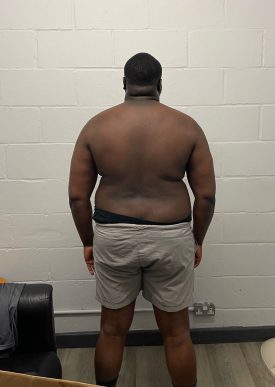
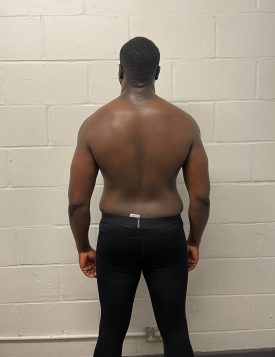
Fighting for a fitter future
Despite losing his boxing match by one point, Folawiyo won’t be giving up just yet: “I’ve joined an amateur boxing gym and I train from 6am to 7am every day in Bromley. I want to drop down to 90kg by the beginning of December, ready for my next fight.”
Plus, he’s aiming for a sub-1hr 55min half marathon in October this year.
As for Folawiyo’s worrying doctor’s diagnosis from January 2022?
“Just five months later I went back for an appointment and was told my sugar levels were very good for my age and back to normal without any need for medication. I’m now sleeping for around six hours a night, too.”
Ola Folawiyo’s weight-loss advice for anyone who wants to trim down
- You have to believe it – “Before Will suggested he devise a weight loss plan for me, I was saying yeah I could do it. It takes real mental strength.”
- Don’t listen to everyone – “Stick to one specialist for advice. You get a lot of conflicting opinions about weight loss. People’s views on carbs for example and when and what to eat. I just listened to Will.”
- You can’t out-train a bad diet – “I saw the most results when I honed in on my diet and started meal prepping.”
- Pick a sport as a hobby – “It’s demotivating just going to the gym, looking at the machines and not knowing what you’re doing. Your work might have a sports team or maybe there’s a club you can join nearby.”
- It’s not a race – “Pace yourself. It took seven months for me to lose the weight; I thought that was a long time, but everyone said it was short. So don’t compare yourself to anyone either.”
PT Will Duru’s 5 best fat-loss tips
- Learn to close your mouth – “Not everything you see you have to eat and not everything that tastes good is good for you.”
- Practice portion control – “It’s the best way to measure calories as you’re not overeating or overindulging. Once or twice a week I eat doughnuts and a double patty cheeseburger.”
- Don’t binge drink – “It’s better to have one glass of wine every day than binge it all in one go. You’re able to process it, and control the calories. Plus you’ll eat less junk food the next day as you won’t have a hangover.”
- Take up boxing – “It’s good for stress relief – an emotional outlet. It’s also been linked with reducing the risk of Parkinson’s and Alzheimer’s disease.”
- Start off light – “You should always start any program using just your bodyweight, then slowly build to weights, to avoid injuries and nail the form. If you can’t lift your own body weight, then you shouldn’t be doing weights.”

